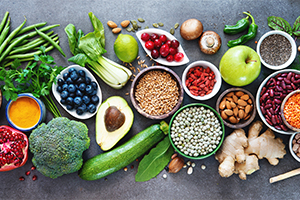News
Healthy Diet, Healthy Life
Date: 03/01/23

Welcome to March, National Nutrition Month. As the fuel that powers our bodies and minds, the food we eat impacts how well they function.[1] Like putting premium gas in your car, eating healthy food helps our bodies to be their best – achieving and maintaining good health and reducing the risk of chronic diseases.[2]
What is good nutrition?
In general, healthy eating means getting a variety of foods, limiting certain kinds of carbs and fats, watching out for salt, and being aware of your portion sizes.[3] While the amount you eat varies based on many factors (including your age, gender, and activity level), in general, a healthy adult diet includes:[4][5]
- Fruit: Eat about 1 ½ - 2 cups of fruit a day. Whole fruit is better than juice because it contains fiber.
- Vegetables: 2 – 4 cups per day of vegetables, in a variety of colors. Be sure to include some leafy greens.
- Grains: Six servings of grains a day. At least half should be whole grains, not refined. One serving is one slice of bread or a small tortilla, 1 cup of cereal, or ½ cup of cooked rice or pasta. If you’re looking for a snack, 3 cups of low-fat popcorn counts as a grain serving.
- Dairy: Three cups of low-fat or non-fat milk, cheese, or yogurt. Sorry, but foods made from dairy that are high in fat and low in calcium, like sour cream, cream, and butter don’t count! If you can’t or don’t eat dairy, unsweetened soy products are a good choice.
- Protein: Five to seven ounces of lean meat or poultry, seafood, eggs, beans, peas, lentils, nuts, seeds, or tofu. Eating a variety of these products helps to make sure you get other important nutrients, like Vitamin D.
In addition to including healthy foods, it’s important to limit unhealthy foods – those with added sugar, high in saturated fat, or high in salt.
Diet and physical health
You already know that eating healthy helps you look and feel your best. But you may not know some of the other benefits for your physical health. Among these are:[6]
- Healthy skin, teeth, and eyes
- Strong muscles and bones
- A healthy immune system
- Lower risk of heart disease, type 2 diabetes, and some cancers
- Good digestion
- And it may even help you live longer!
Diet and mental health
In addition to the benefits to your physical health, eating well can also benefit your mental health. Have you ever noticed that skipping a meal or eating “junk food” makes you feel foggy? That’s because you’re missing out on the nutrition your brain needs to think clearly and feel more alert. Healthy food also improves concentration and attention span. Sugar and other processed foods may also increase inflammation, which may contribute to anxiety and depression.[7] Instead, focus on the healthy foods above, especially seafood, beans, nuts, and green leafy vegetables.
Your EAP can help
If you need more help meeting your nutrition goals, contact your EAP. MHN has certified wellness coaches who can provide individualized guidance, education, and encouragement – at no charge to you.
[1] Healthy Diet: Eating with Mental Health in Mind | Mental Health America (mhanational.org)
[2] Dietary Guidelines for Americans, 2020-2025 - Executive Summary in English
[3] Plan Your Plate | NIH News in Health
[4] MyPlate | U.S. Department of Agriculture
[5] The Importance of Good Nutrition | Tufts Health Plan Medicare Preferred (tuftsmedicarepreferred.org)
[6] Benefits of Healthy Eating | Nutrition | DNPAO | CDC
[7] Eating Well for Mental Health | Sutter Health
.jpg)
